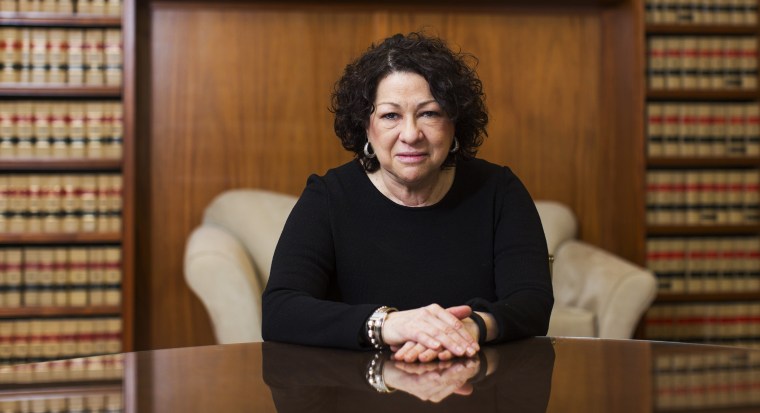Justice Sonia Sotomayor — the only Hispanic on the Supreme Court — said Wednesday in a rare interview that she didn't believe President Barack Obama would actually nominate her until the call came in 2009.
“Everyone else that had been on his short list had been interviewed and I wasn’t being interviewed," Sotomayor said on "Red Table Talk: The Estefans," on Facebook. "I thought, ‘Gee, maybe I’m just there for show."
Then the White House called to say Obama was on the line.
“At that moment, my heart started to thump," Sotomayor said. "Within seconds, the president of the United States gets on and says, 'I have decided that I would like you to be my nominee to the United States Supreme Court.'"
Sotomayor was interviewed remotely by Gloria Estefan, the Grammy-winning singer; her daughter, Emily Estefan; and her niece Lili Estefan. (On Tuesday night, Estefan announced on Instagram that she had Covid-19 last month, but she suffered mild symptoms.)
“When I think of women that I admire, this fierce, fearless trailblazer is high on my list,” said Gloria Estefan about Sotomayor.
When asked by Emily Estefan what advice she had for the younger generation, Sotomayor urged them to be involved locally.
"Emily, you have no choice. Your vision won't happen simply because you desire it. Your vision only happens with hard work and commitment to doing the right thing," she said. "I speak to kids all the time and I tell them that the most important role in their life is being not a citizen with a capital 'C,' a citizen of a country, but being a citizen with a small 'C,' a citizen of your community. That's the most important role you can play in life."
It all started in the Bronx
At the age of 10, Sotomayor knew she wanted to be a judge after being inspired by the TV show "Perry Mason." Her path to the highest court in the land began in the Bronx, a heavily Hispanic New York City borough, with an upbringing that came with its own hardships.
Living in a housing project blocks away from the Yankee Stadium, Sotomayor said she faced serious illness, poverty and a one-parent household after the death of her father. A daughter of Puerto Ricans, she was 7 when she was diagnosed with life-threatening juvenile diabetes and had to inject insulin shots herself. After her father died — he had a history of alcoholism — she wrote about trying to snap her mother out of a paralyzed state of grief, in her memoir, “My Beloved World.”
However, her intelligence at a young age was evident, and her academic achievements led her to Princeton and Yale Law School. Sotomayor went on to become the first Hispanic judge in the U.S. District Court for the Southern District of New York.
Taking a stand
As is customary with justices, Sotomayor did not talk about her work on the Supreme Court in her interview with the Estefans.
But Sotomayor has emerged as a strong liberal voice on the court. Just last week she wrote a fiery dissent, taking issue with the court’s majority position that found that New York's Covid-19 restrictions violated the First Amendment’s protection of free exercise of religion.
“Justices of this Court play a deadly game in second guessing the expert judgment of health officials about the environments in which a contagious virus, now infecting a million Americans each week, spreads most easily," Sotomayor wrote.
And in a ruling in June that blocked the Trump administration from ending the Deferred Action for Childhood Arrivals program (DACA) — which allows young immigrants without legal status to work and study without fear of deportation — Sotomayor pointed out in a separate opinion that the president's decision to end DACA was "contaminated" by a history of discriminatory remarks against Mexican and undocumented immigrants, and she called out her colleagues for not acknowledging this.
"I would not so readily dismiss the allegation that an executive decision disproportionately harms the same racial group that the President branded as less desirable mere months earlier,” she wrote.
Follow NBC Latino on Facebook, Twitter and Instagram.


